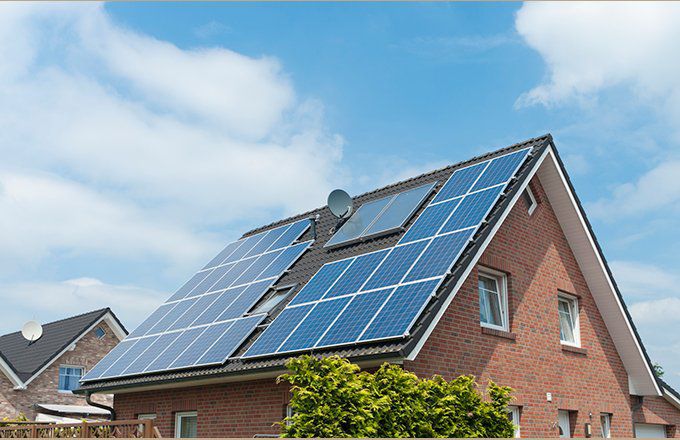
Harnessing the Power of the Sun: The Advantages of Solar Energy for Residential Properties
Solar energy has become an increasingly popular option for powering homes in recent years, allowing households to take advantage of a clean and renewable source of energy. Harnessing the power of the sun not only helps homeowners reduce their carbon footprint, but it also offers numerous financial benefits in the long run. From rebates and incentives to improved property values, there are plenty of reasons why more homeowners are eager to make the switch to solar energy. If you’re looking to delve into the world of solar energy for residential properties, check out this comprehensive guide on benefits, costs, installation, and maintenance at https://constructionreviewonline.com/home-and-office/solar-energy-for-residential-properties-benefits-costs-installation-and-maintenance/.
In this blog post, we will explore the advantages of solar energy for residential properties. From reducing energy bills to promoting energy independence, we will delve into the various financial and environmental benefits of solar panels. Additionally, we will discuss some of the main considerations you should keep in mind if you are considering installing solar panels on your property. With practical tips and expert insights, this blog post will help you understand why so many homeowners are opting for solar energy and how you can reap the rewards of this innovative technology.
Cost Savings on Energy Bills
Solar energy is an increasingly popular option for residential properties, and for good reason. One of the biggest advantages of solar energy is the cost savings on energy bills. By installing solar panels, homeowners can generate their own electricity and reduce their reliance on traditional power sources, which can be expensive and unreliable. In addition, excess energy generated by solar panels can be sold back to the grid through programs such as net metering, further reducing energy costs. While the initial investment in solar panels may seem daunting, the long-term financial benefits are clear. Homeowners who harness the power of the sun can expect to see significant savings on their energy bills over time, ultimately paying less for the same amount of electricity.
Reduced Carbon Footprint
A significant advantage of solar energy for residential properties is the potential to reduce the carbon footprint. Traditional energy sources like coal and natural gas produce harmful greenhouse gases that contribute to climate change and environmental degradation. By installing solar panels, homeowners can generate their own clean energy, reducing reliance on these unsustainable sources. Furthermore, solar energy systems do not produce direct emissions or pollution, making them a greener option compared to traditional sources. As governments and organizations around the world continue to prioritize sustainability and seek ways to mitigate climate change, solar energy offers a viable solution to reducing carbon emissions and promoting environmental stewardship for both individuals and communities.
Increased Home Value
Harnessing solar energy is not only a sustainable and eco-friendly choice, but it can also increase the value of your residential property. The installation of solar panels can add significant economic value to your home, as it ensures energy cost savings for the future homeowners. A 2019 study found that homes with solar panels installed sold on average for $15,000 more than comparable homes without solar panels. Furthermore, homes equipped with solar panels are likely to sell faster than those without, as they offer an attractive incentive of clean energy and immediate savings on electricity bills. By investing in a solar energy system, homeowners can create lasting value for themselves while simultaneously reaping the benefits of more affordable renewable energy.
Abundance of Available Resources
One of the advantages of solar energy for residential properties is the abundance of available resources. As long as the sun continues to shine, homeowners can rely on solar panels to generate electricity for their homes. Unlike traditional energy sources, sunlight is free and renewable, making solar energy a cost-effective and sustainable option. Furthermore, the resources needed to manufacture solar panels, such as silicon, are widely available, ensuring that the production of solar panels can continue to meet the growing demand for renewable energy. As technology advances, the efficiency and affordability of solar panels continue to increase, making solar energy an increasingly viable option for homeowners. Overall, the abundance of available resources for solar energy ensures its longevity as a reliable and sustainable energy source for residential properties.
Government Incentives and Tax Credits
One of the most significant advantages of solar energy for residential properties is the availability of government incentives and tax credits. Several states and municipalities offer various incentive programs to encourage homeowners to install solar panels on their properties. These programs provide financial assistance to cover the upfront costs of the solar panel installation, thereby making it more affordable for homeowners. Additionally, the federal government extends a 26% tax credit for homeowners who install solar panels on their properties, allowing them to deduct a certain percentage of the installation cost from their federal income taxes. These incentives and tax credits can save homeowners thousands of dollars in the long run, making solar energy an attractive option for those looking to reduce their energy bills while helping the environment.
Conclusion
To sum up, solar energy continues to be an increasingly viable and sustainable alternative to traditional fossil fuels for powering homes. With its potential to reduce energy costs, increase home values, and promote a cleaner environment, it’s no surprise that more and more homeowners are making the switch to solar energy. As technology continues to improve and costs decrease, solar energy is poised to become even more accessible and commonplace in the near future. Harnessing the power of the sun is not only a smart financial decision but also a responsible step towards a cleaner and brighter future.


